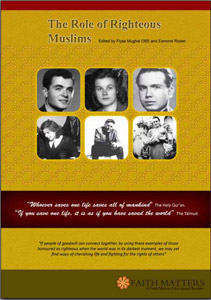 Earlier this year I pointed out how in the Western context hatred towards Muslims and Jews are usually linked, meaning someone harbouring hatred to one group is more likely to hate the other as well.
Earlier this year I pointed out how in the Western context hatred towards Muslims and Jews are usually linked, meaning someone harbouring hatred to one group is more likely to hate the other as well.
The natural conclusion I advanced was that the two groups should work collaboratively to fight hatred against them all.
A British group called Faith Matters has developed a new brochure, pointing out some of the roles Muslims took on during the Holocaust in protecting the lives of Jews.
The narrative of Muslim individuals in different contexts, including Albania, Tunisia, Morocco, Turkey, Croatia, Bosnia and Herzogovnia, help illustrate the role that many individuals played in opposing Axis forces.
There’s even a story of a contemporary Muslim lawyer living in Palestine, Khaled Mahameed, who has founded the first Arab Holocaust museum in Nazareth called The Arab Institute for Holocaust Research and Education. Mahameed believes the political backdrop of the Holocaust is an important component for Arabs to understand in order to foster greater dialogue between the two groups.
The intent behind the publication is to promote greater understanding and cooperation between the two groups,
Today, unfortunately, xenophobia and fear ‘of the other’ still continue to plague societies and the United Kingdom is not immune to these issues. The caricaturing of communities continues in some quarters and the lessons of history are not learnt. Yet, history should teach us and guide us so that we preserve the stories of our common humanity and social links which should not be forgotten. Furthermore, these stories should not be physically or mentally shelved as though they have no significance in the modern world. If anything, they have a greater significance today then they would have had 10, 20 or 30 years ago.
The Righteous Muslims booklet shows us that there are many stories of positive Muslim and Jewish interaction, even at the darkest moments in history. It shows a common bond and a link between people of two faiths who believe in the compassion of God and in the sanctity of life. Whilst the politics of the Middle East may block such stories out of the public narrative, there is a duty on us all to ensure that they get their rightful place in our social and educational narratives.
 Of course there are some misgivings about the brochure already, with some expressing misgivings that the brochure glosses over Muslim involvement in supporting the Nazis.
Of course there are some misgivings about the brochure already, with some expressing misgivings that the brochure glosses over Muslim involvement in supporting the Nazis.
But that’s a narrative we already hear enough of, even on full-page advertisements in Canadian newspapers.
This brochure provides a more nuanced perspective, demonstrating that people of a global faith could be found on all sides of the political spectrum, thereby avoiding gross generalizations and stereotypes of normative relationships between the faiths.
Another recent initiative that could help foster better relationships between these communities is a project by Robert Harush, an Israeli businessman from Ashkelon who has decided to renovate a major mosque in France. He’s doing this despite living in Ashkelon during Operation Cast Lead, and even having a rocket land in his house.
There are other great resources that expand on these complex relationships during WWII such as the PBS documentary and website, Among the Righteous, based on a book by Dr. Robert Satloff, Among the Righteous: Lost Stories from the Holocaust’s Long Reach into Arab Lands. The Faith Matters brochure was also originally modeled off Satloff’s book.
Watch the full episode. See more Among the Righteous.
Satloff claims that the reason why these stories haven’t been told for so long is that Jews didn’t look hard enough, and Arabs didn’t want to be found,
Somewhere over the past 50 years it became toxic in Arab societies even to recognize this wonderful act of humanitarianism.
Here’s a video by Dr. Satloff telling the story behind his book:
